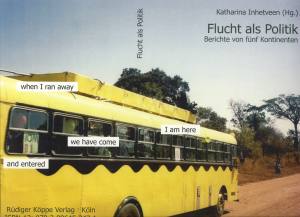
Flucht als Politik
Berichte von fünf Kontinenten
Edited by: Katharina Inhetveen. With contributions by: Sigrid Baringhorst, Jeff Crisp, Katharina Inhetveen, Georg Klute, Katrin Radtke, Jakob Rösel, Trutz von Trotha †, Simon Turner, Markus Weimann. Series edited by: Trutz von Trotha †, Rainer Geißler.
Series: SBS Siegener Beiträge zur Soziologie Volume 5
2006229 pp.
2 maps, 2 illustrations, 1 diagram, 1 table
Text language(s): German, English
Format: 160 x 240 mm
470 g
Paperback
€ 39.80
Buy 'Flucht als Politik' as a downloadable PDF document directly from our online shop »
Order 'Flucht als Politik' as print edition »
Escape can be defined in terms of people leaving spatial situations in which they undergo, or feel endangered by violence or other disadvantages. Cases of escape have an enormous spectrum, and the political dimensions are identifiable in each of these cases. On the one hand they can be seen as direct consequences or even intention of the politics, on the other hand escape itself has political consequences, and can be used as a political instrument or power resource by refugees.
The issue Escape as policy focuses on the fact that refugees themselves can hold the part of powerful agents, and therefore the social sciences should not simply adopt the popular picture of defenceless victims. The present work throws lights on a wide subject area. The contributions deal with empirical issues from five continents. Investigations in social sciences, politics sciences, law, cultural anthropology, and other contexts give copious insights across disciplinary boundaries.
Besides academic working authors also authors with practical experiences are participating in this book, so that the contributions illuminate issues about the coherence between escape and politics in theoretical and empirical diversity.
CONTENTS
Katharina Inhetveen: Vorbemerkungen
I. Flucht als Politik
Trutz von Trotha: Von der Ohnmacht der Flucht zur Macht der Kündigung. Flucht als bewegtes Machtverhältnis – Ein theoretischer Essay
Simon Turner: Biopolitics and Bare Life in a Refugee Camp – Some Conceptual Reflections
II. Strategien der Flucht
Georg Klute: Flucht zum eigenen Zelt – Sahara-Nomaden als Spezialisten der Flucht
Katharina Inhetveen: Situative Fluchten – Mobilität und Macht in einem sambischen Flüchtlingslager
Markus Weimann: Steuerflucht
III. Flüchtlinge als politische Akteure
Jakob Rösel: Die Mohajir in Karachi, Pakistan – Flucht und Politik
Katrin Radtke: Die Finanzierung von Bürgerkriegen aus der Diaspora – Eritreer in Frankfurt und Tamilen in Toronto
IV. Flüchtlingspolitik
Sigrid Baringhorst: White Nation – Nationale Identität, Ängste und Flüchtlingspolitik in Australien
Jeff Crisp: A New Asylum Paradigm? Globalisation, Migration and the Uncertain Future of the International Refugee Regime
Autorinnen und Autoren
Summaries / Zusammenfassungen
Review in “Portal für Politikwissenschaft”
Following these links you will find further empirical studies on migration, asylum and transnationalism:
Accompanying material:
- Asylverfahren und Gerechtigkeit
(ISBN 978-3-89645-854-4 ) - Lifeworlds of Young Men beyond Migration and Immobility in Pikine, Senegal
(ISBN 978-3-89645-914-5 ) - Migration and Conflict
(ISBN 978-3-89645-903-9 ) - Nation im Exil?
(ISBN 978-3-89645-826-1 ) - Spaces in Movement
(ISBN 978-3-89645-905-3 ) - The Global Nuer
(ISBN 978-3-89645-908-4 )
Cross-reference:
- “Safe Havens” for Refugees
(ISBN 978-3-89645-339-6 ) - Heimkehr aus Babylon
(ISBN 978-3-89645-913-8 ) - Nomades des espaces interstitiels
(ISBN 978-3-89645-252-8 ) - The Ingrained Art of Survival
(ISBN 978-3-89645-250-4 ) - The Problem of Violence
(ISBN 978-3-89645-891-9 )
Reviews
"Die Flucht ist eine Bewegung in einem Machtverhältnis, das von der Ohnmacht des Gejagten über das Erreichen eines Raums, der vor dem Zugriff der Macht schützt, bis zur direkten Umkehrung des Machtverhältnisses zwischen Jäger und Gejagtem reicht" (22), schreibt von Trotha und liefert mit diesen grundsätzlichen Überlegungen zum Verhältnis von Flucht und Macht einen breiten Bezugsrahmen für die übrigen Beiträge des interdisziplinär angelegten Bandes. Schlaglichtartig werden die vielfältigen Erscheinungsformen von Flucht, die sowohl Folge als auch Ziel von Politik sein kann, aufgezeigt.
Anke Rösener in Zeitschrift für Politikwissenschaft, 3/2007, 1036
| « back | Print version | [top] |
 Books
Books Audio
Audio Biographies
Biographies Series
Series Festschrifts
Festschrifts Journals
Journals